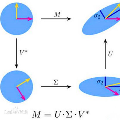The synergy of metasurface-based holographic surfaces (HoloS) and reconfigurable intelligent surfaces (RIS) is considered a key aspect for future communication networks. However, the optimization of dynamic metasurfaces requires the use of numerical algorithms, for example, based on the singular value decomposition (SVD) and gradient descent methods, which are usually computationally intensive, especially when the number of elements is large. In this paper, we analyze low complexity designs for RIS-aided HoloS communication systems, in which the configurations of the HoloS transmitter and the RIS are given in a closed-form expression. We consider implementations based on diagonal and non-diagonal RISs. Over line-of-sight channels, we show that the proposed schemes provide performance that is close to that offered by complex numerical methods.
翻译:暂无翻译



